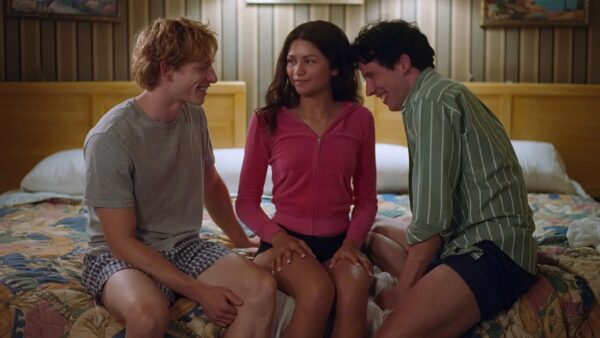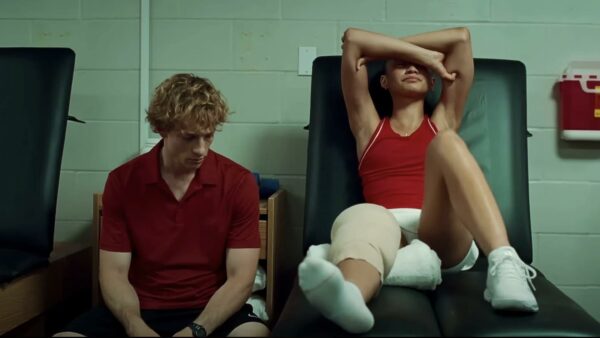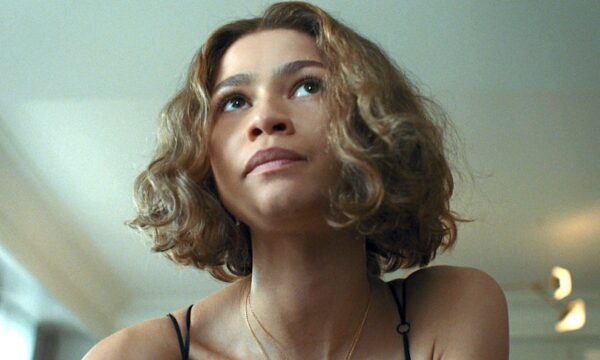
Let’s get this out of the way immediately: Challengers is hot.
Famed queer writer/director Luca Guadagnino has crafted a highly eroticized sports film wherein tennis is synonymous with both sex and relationships. Regardless of whether audiences like (or even care about) tennis is immaterial; this is a soapy film focusing on a romantic triangle between a beautiful woman and the two men who love her*
*And also each other.
The asterisk is hardly necessary considering the way the film has been marketed: promotional stills and trailers have emphasized the scene in which Art Donaldson (Mike Faist) and Patrick Zweig (Josh O’Connor) sit on either side of Tashi (Zendaya) and make out with her, then each other.
Out of context the scene plays like bisexual titillation (which, fair), but within the world of the film, this moment carries a great deal more weight.

Challengers covers a thirteen year timeline during which time best friends Art and Patrick fall in love with the same woman, causing the dissolution of their friendship and instigating a competitive rivalry that persists into the present. The film, from first time screenwriter Justin Kuritzkes, cuts back and forth between the auspicious first meeting of Tashi and the boys thirteen years earlier and the present-day tennis final when their situations are completely different.
One of the strengths of this approach is that it generates plenty of questions. This includes: if Patrick dated Tashi in the past, then how does she end up married to Art in the present? Why did the two men have a falling out? When and how was Tashi injured, forcing her early retirement from tennis and a shift into coaching? And what is the nature of the eye-fucking that’s happening between Patrick and Tashi during the Challenger final in New Rochelle?

The strategy works best early on, but ultimately proves distracting when the past catches up to the present in the last act. This “adult” section of the film is its weakest; not only because the answers to the aforementioned questions have mostly been answered, but also because the film’s focus has shifted from Art and Patrick to Tashi.
Unfortunately Zendaya is less convincing as a wife and mother than she is as a hungry, highly competitive College tennis player. While costume designer Jonathan Anderson drapes the star in beautiful clothes, the combination of Zendaya’s slightly wobbly performance and the sophisticated wardrobe sometimes feel more like dress-up than an actual character. She appears slightly out of her depth, while her male co-stars fare better by being asked to do less.
Zendaya is much more believable when Tashi is closer to her own age. Not helping matters is the complete lack of chemistry between her and Faist, though this could be intentional choice since Tashi has fallen out of love with Art while he suffers through a late-career losing streak. Not unlike Boogie Nights, the film is on a high in the beginning and middle sections when the youthful characters are both professionally and sexually vibrant. When they hit roadblocks as adults, things become more fraught – for the characters, as well as the film’s energy.

Visually the film is masterfully shot and edited. Guadagnino favours intimacy; he loves shooting fetishized body parts and lingering touches in close-up. The tennis, in particular, is very exciting, especially the ostentatious final at New Rochelle, where cinematographer Sayombhu Mukdeeprom literally puts the audience under the surface of the court, as well as the point of view of the ball that Art and Patrick hit back and forth.
More divisive is the score by Trent Reznor and Atticus Ross, which evokes EDM, but is frequently used to undercut serious dramatic scenes in the same campy, histrionic vein as Todd Haynes’ May December. It’s a bold, ridiculous technique that is apt to have some audiences scratching their heads while others howl with laughter.

Overall, Challengers is a lurid, mildly pulpy sports melodrama. The first half – with its lingering questions and hormonal sexuality between the three leads – is when the film works best. Alas, it loses its emotional weight in the last act, despite the excitement of the final match.
For Guadagnino, this is pretty shallow popcorn fare. It’s also apt to be his biggest mainstream box office success (at least since Call Me By Your Name). Let’s hope that his next collaboration with Kuritzkes, Queers, has slightly more substance. 3.5/5
Challengers is in theaters April 26, 2024.